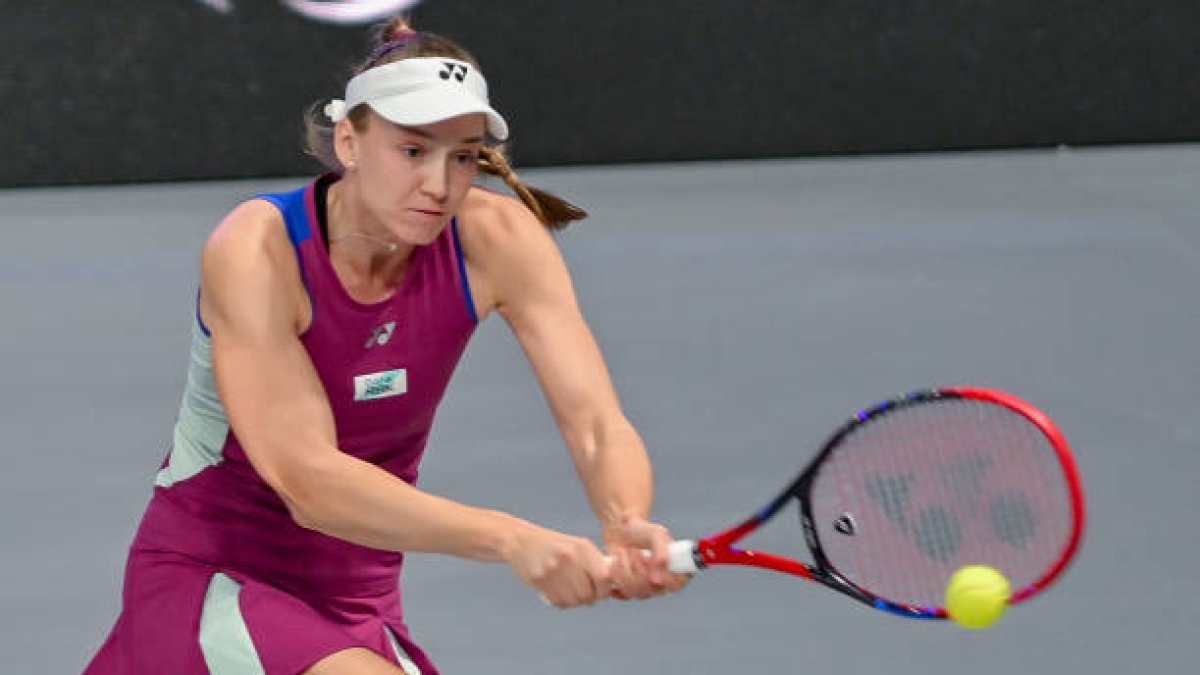
Elena Rybakina, the reigning Wimbledon champion and one of the most formidable players on the WTA Tour, has often displayed resilience in the face of challenges. However, as she prepares for her next match against Spanish up-and-comer Jessica Bouzas, the Kazakh star openly admitted that jet lag might be her toughest opponent this time.
Having traveled across time zones to compete in this tournament, Rybakina faces a combination of physical fatigue and mental adjustment that could impact her performance. Despite being the favorite on paper, she acknowledged the difficulty of the situation during a pre-match interview, emphasizing that her body is still adapting to the time difference.
The Toll of Constant Travel
Jet lag is an inevitable challenge for professional tennis players who compete year-round across the globe. The constant travel, often between continents, leaves players grappling with disrupted sleep patterns, fatigue, and decreased focus. For Rybakina, who has experienced a grueling schedule this season, the effects of jet lag are nothing new. However, the timing of her current struggle adds a layer of unpredictability to her upcoming match against Bouzas.
“It’s not just about the physical tiredness,” Rybakina explained. “When you’re jet-lagged, it can be hard to get into the right rhythm mentally. The body feels one way, but the mind is struggling to catch up. That’s the real challenge.”
Rybakina’s Stellar Season
Elena Rybakina’s rise to prominence has been marked by a combination of power, precision, and poise. Her breakthrough came in 2022 when she won Wimbledon, showcasing her ability to handle high-pressure situations with remarkable composure. Since then, she has continued to establish herself as one of the top players on the tour, consistently delivering strong performances in both Grand Slam and WTA events.
In 2024, Rybakina has already added several titles to her name, cementing her place among the elite. Her aggressive baseline game and booming serve make her a formidable opponent, while her improved movement and tactical awareness have allowed her to adapt to various playing conditions.
However, even the best players are not immune to the physical demands of the tour. For Rybakina, balancing her packed schedule with adequate recovery has been a constant battle. The jet lag she is experiencing now is a stark reminder of the toll that professional tennis takes on its athletes.
A Test Against Bouzas
Jessica Bouzas, her opponent in the upcoming match, represents a different kind of challenge. The 21-year-old Spaniard is a rising star in women’s tennis, known for her agility, counterpunching ability, and determination. While she lacks the experience and accolades of Rybakina, Bouzas has a knack for frustrating higher-ranked opponents with her consistent play and tactical approach.
Bouzas will likely view Rybakina’s jet lag as an opportunity to capitalize on her opponent’s potential lack of sharpness. The Spaniard’s game revolves around long rallies and forcing errors, a strategy that could prove effective if Rybakina struggles with her timing and energy levels.
“It’s going to be a very tough match,” Rybakina admitted. “Jessica is a talented player who fights for every point. I’ll need to stay focused and try to manage my energy as best as I can.”
Coping Strategies for Jet Lag
Dealing with jet lag is an ongoing challenge for professional athletes, and Rybakina is no exception. Over the years, players have developed various strategies to mitigate its effects, from controlled naps and hydration to carefully planned meal times and exposure to natural light.
For Rybakina, the focus will likely be on optimizing her recovery in the limited time she has before taking the court. This might include light training sessions to keep her body moving, massages to reduce muscle tension, and mental exercises to maintain focus.
“It’s all about managing the small details,” Rybakina said. “You can’t completely get rid of jet lag overnight, but you can make small adjustments to feel a bit better. That’s what I’m trying to do now.”
The Broader Implications
While jet lag may seem like a temporary hurdle, its impact can extend beyond a single match. For players like Rybakina, maintaining a balance between peak performance and long-term health is crucial. Pushing through fatigue increases the risk of injury and burnout, both of which can derail a promising season.
Rybakina’s candid acknowledgment of her struggles also highlights a broader issue within professional tennis: the demanding travel schedule. With tournaments spread across the globe, players often have little time to recover between events, leading to physical and mental exhaustion.
Some players have called for adjustments to the tour calendar, including more regionalized scheduling to reduce travel. While changes to the system are unlikely in the near future, the conversation underscores the need for greater support for athletes navigating the challenges of a global tour.
Rybakina’s Resilience
Despite the challenges she faces, Rybakina remains optimistic about her chances against Bouzas. Her ability to stay composed and adapt to adversity has been a defining feature of her career, and she will rely on these qualities once again as she takes to the court.
“I’ve been in tough situations before, and I’ve learned a lot from those experiences,” she said. “This is just another challenge, and I’ll do my best to overcome it.”
Conclusion
Elena Rybakina’s match against Jessica Bouzas promises to be an intriguing clash, not just of styles but also of circumstances. While Rybakina’s jet lag adds an element of unpredictability, her determination and skill make her a formidable opponent.
For Bouzas, the match presents an opportunity to test herself against one of the best in the world and potentially pull off an upset. For Rybakina, it is another chapter in her journey of resilience and excellence, a testament to the grit and determination required to succeed at the highest level of the sport.
As fans eagerly await the outcome, one thing is clear: Rybakina’s candid admission about her struggles only adds to the respect she commands as one of tennis’s most relatable and inspiring figures.
Leave a Reply